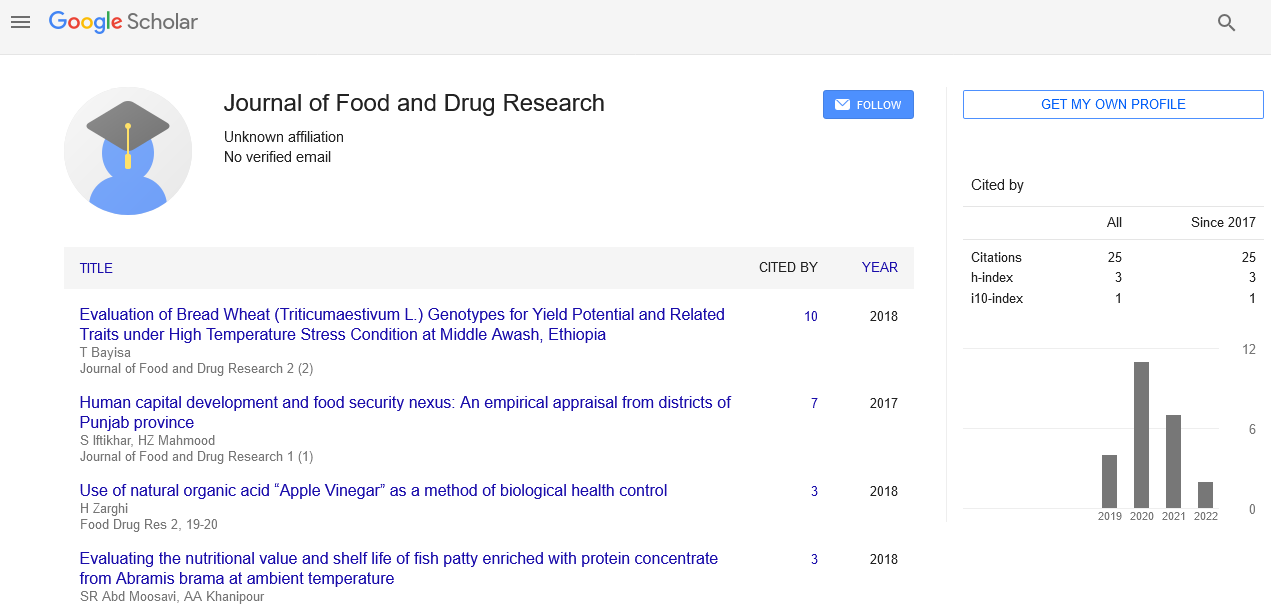Food reactions mediated by the immune system in irritable bowel syndrome
Received: 15-Oct-2022, Manuscript No. PULJFDR 22-5731; Editor assigned: 17-Oct-2022, Pre QC No. PULJFDR 22-5731 (PQ); Accepted Date: Oct 25, 2022; Reviewed: 20-Oct-2022 QC No. PULJFDR-22-5731 (Q); Revised: 22-Oct-2022, Manuscript No. PULJFDR-22-5731 (R); Published: 30-Oct-2022, DOI: 10.37532/ puljfdr.22.6(5).1.
Citation: Oyeyemi S. Food reactions mediated by the immune system in irritable bowel syndrome. J. Food Drug Res. 2022; 6(5):01-02.
This open-access article is distributed under the terms of the Creative Commons Attribution Non-Commercial License (CC BY-NC) (http://creativecommons.org/licenses/by-nc/4.0/), which permits reuse, distribution and reproduction of the article, provided that the original work is properly cited and the reuse is restricted to noncommercial purposes. For commercial reuse, contact reprints@pulsus.com
Abstract
A chronic functional gastrointestinal illness called Irritable Bowel Syndrome (IBS) is characterized by recurring abdominal pain and a changed defecation pattern. It affects between 5% and 10% of the general population, depending on the parameters utilised, and significantly lowers quality of life. The majority of IBS patients experience an onset or worsening of their symptoms, particularly stomach pain, after consuming particular foods. This begs the question of what part, if any, diet plays in the pathophysiology of IBS. In this review, we outline the various risk factors for IBS and provide an overview of how food might cause IBS by highlighting immunological and non-immune responses to food. Last but not least, we describe recent research showing that food-induced stomach pain in IBS is caused by an immune-mediated mechanism.
Key Words
Gastrointestinal illness; Chronic; Abdominal pain; Nonimmune responses; Food-induced
Introduction
Depending on the diagnostic criteria employed the prevalence of DIrritable Bowel Syndrome (IBS), a chronic gastrointestinal illness, and ranges from 5% to 10% in the general population. Absent an organic cause, it is characterized by recurring stomach pain and discomfort that is linked to a changed faeces pattern. Based on the most common stoma pattern, there are four kinds of IBS: IBS with diarrhea, IBS with constipation, IBS with mixed stools, and IBS undefined. Contrary to somatic pain, visceral pain refers to pain that originates from within organs. It is typically viewed as diffuse and challenging to precisely locate. Currently, it is believed that abnormal visceral pain signaling or Visceral Hypersensitivity (VHS) is what causes visceral pain in IBS. A greater awareness of both non-noxious (allodynia) and noxious (hyperalgesia) sensations coming from visceral organs, such as the stomach, is referred to as VHS. VHS is a defining feature of IBS, affecting 30%–60% of individuals, and is linked to the intensity of symptoms. Since 1973, an increasing number of papers have noted that IBS patients have a lower pain threshold than healthy people in reaction to rectal distention. The gut, spinal cord, and central nervous system are just a few of the locations along the gutbrain axis where VHS might develop as a result of changes in pain signaling. Patients with IBS may develop VHS due to the increased activation, upregulation, or sensitization of primary afferent nociceptors in the gut. We have particularly demonstrated that, in contrast to healthy controls, submucosal neurons in rectal biopsies from IBS patients respond more strongly to agonists of pain-sensing receptors (TRPV1, TRPA1BS) is linked to a considerable socioeconomic burden as well as a significant decline in quality of life. Despite this, existing therapies are limited to symptom management and primarily target gastrointestinal motility (antidiarrheal drugs and laxatives), largely leaving abdominal discomfort unchanged and hence their generally underwhelming outcomes. On the other hand, with varying degrees of efficacy, antidepressants or mind-gut treatment are used to lessen gastrointestinal pain. All things considered, there is a definite need for efficient medications that target visceral pain signaling in particular. The dearth of effective therapeutic alternatives, particularly for treating abdominal discomfort, is clearly due to a lack of understanding of the pathophysiology of the illness. The lack of illness biomarkers and the heterogeneity of the IBS patient group, as shown by the range of triggers and etiologies, which supports the possibility of several disease mechanisms, make it difficult to examine the aetiology of IBS. New therapeutic options and prospective improvements in clinical management of the condition are being offered by recent insights into the pathophysiological underpinnings of IBS, particularly the role of immune-mediated reactions to food. We will discuss the significance of food reactions in the onset of IBS in this review, paying particular attention to immune-mediated reactions.






